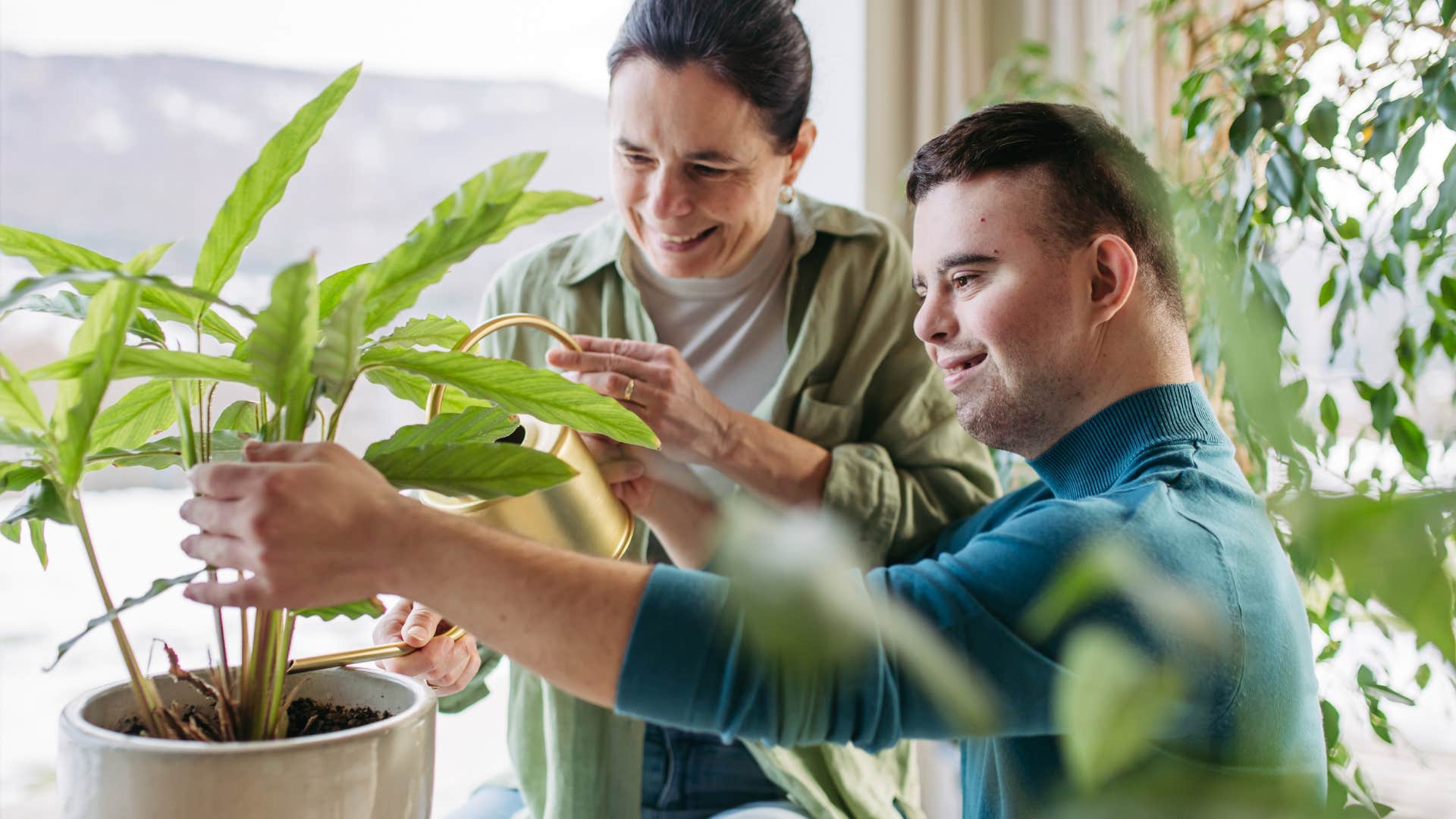11 Manners Truly Thoughtful People Were Taught Growing Up
A parent's commitment to teaching basic empathy and self-awareness can be profoundly impactful for adult children.
 soul kitchen | Shutterstock
soul kitchen | Shutterstock While it might seem like an incredibly overwhelming task for new parents, many children learn their foundational social skills, like open communication, self-awareness, and empathy from their childhoods — not just directly, but also by watching their parents' dynamic, relationships, and self-care.
From navigating relationships, to cultivating a safe internal monologue, and building self-esteem, the manners truly thoughtful people were taught growing up have the power to shape their adult lives in profound ways.
Here are 11 manners truly thoughtful people were taught growing up
1. Listen before you speak
 Anna Grant | Shutterstock.
Anna Grant | Shutterstock.
Even in passive interactions and conversations with strangers, thoughtful people commit to the practice of active listening to ensure other people in their lives feel heard and understood, as a study in the International Journal of Listening argues is essential for healthy relationships.
Especially for children growing up, seeing their parents navigating conflict from an empathetic place with open communication like this is incredibly important. It doesn't teach them to fear arguments or conflict, but rather embrace it, and take it as an opportunity to bond with another person.
2. Express gratitude for the little things
 People Images Yuri A | Shutterstock.com
People Images Yuri A | Shutterstock.com
According to research gathered by Harvard Medical School, thoughtful people who consistently give thanks to others and express gratitude about the little things often live healthier and happier lives than those who don't make it a priority.
While it's possible to learn this kind of empathy in practice, many thoughtful people adopted it from their parents. Their mother might have given them small handwritten thank you notes, or maybe their father was quick to thank a sibling for doing an extra chore or managing their emotions well.
Even the smallest things help to bond people in their relationships, and generally, help to support people's internal self-esteem and emotional well-being as well.
3. Always ask before giving advice
 Dragana Gordic | Shutterstock.com
Dragana Gordic | Shutterstock.com
Unprompted advice isn't just toxic to early childhood relationships, it's one of the most common sparks of conflict between adult children and their parents. When parents give unprompted advice, they dismiss a child's emotions and expression, especially if they were just looking for a listening ear. Not everything has "a solution," sometimes the only thing a person needs is a shoulder to cry on or a person to support them.
Manners like this aren't necessarily taught directly to thoughtful people as kids, but open communication definitely was. According to UNICEF, the healthiest parents teach their kids how to balance verbal and nonverbal communication, especially reading cues about when to support someone and give them space to talk, and when it's appropriate to offer advice.
4. Don't gossip
 Rido | Shutterstock.com
Rido | Shutterstock.com
According to a study in Social Psychological and Personality Science, the average person spends around an hour a day talking about other people, which is a huge portion of our lives, so it's important to set clear expectations and manners with children early in life about how to speak on others, especially when they're not around.
While another study suggests it can be bonding and healthy to gossip occasionally with other people, thoughtful people generally don't make gossip a regular practice in their lives. Instead, they focus on the positive things about people, giving them grace for their mistakes and sticking up for them when they're not around.
5. Give people their personal space
 Halfpoint | Shutterstock.com
Halfpoint | Shutterstock.com
Parents of thoughtful adult children start teaching their kids boundaries at a young age, even if that means simply leading by example or having extremely basic conversations about more nuanced fundamental topics like bodily autonomy or personal space.
According to Counselor Chelsey, teaching kids about personal space starts with respect. How can you show another person respect using consent? How can you ensure you're giving other people the personal space that you also expect from others?
Of course, as children grow into adults these ideas about personal space become more complex and nuanced, but at the end of the day it comes back to this foundation of respect — something that thoughtful people have spent their lives devoted to learning, practicing, and mastering in their relationships.
6. Offer to help people in need
 Chay_Tee | Shutterstock.com
Chay_Tee | Shutterstock.com
Whether it's helping someone carry groceries at the store or letting someone into traffic on a busy road, truly thoughtful people aren't afraid to empathetically put other people first sometimes.
Of course, they're not helping others to a detrimental extent — by people-pleasing or embodying echoist tendencies — they're simply cognizant of how spending their extra time, money, and energy to help someone can be beneficial and fulfilling.
7. Apologize when you make a mistake
 People Images Yuri A | Shutterstock.com
People Images Yuri A | Shutterstock.com
Parents who lead by example to teach their kids accountability tend to have the best luck with cultivating thoughtful adults. Whether it's owning up to their mistakes or listening to their child's emotions, even when they don't agree, they set a comfortable standard for expressing mistakes without judgment.
These are typically the same parents who refuse to frame mistakes as inherent failure, raising persevering, curious, and motivated adults that don't completely shut down when they're challenged.
Of course, in some households, especially for kids who grew up with narcissistic parents, it feels impossible for children to learn how to healthily take accountability, as everyone in their house was constantly shifting blame and victimizing themselves to avoid conflict, arguments, and uncomfortable feelings like shame or embarrassment. This inherent tendency to avoid conflict or take on the role of the "perpetrator" when it was their feelings that were hurt only breeds people-pleasing children who repress their own emotions for the sake of comfort.
8. Be kind to everyone
 People Images Yuri A | Shutterstock.com
People Images Yuri A | Shutterstock.com
Kindness and empathy are two massively important traits in thoughtful people that not only help them with their own self-esteem and awareness, but inform the health of their relationships as well. While research, like a study from Infant Behavior and Development, suggests that many children are born with the foundation for empathy at birth, it's largely a nurtured trait that flourishes in a healthy and open home environment.
Thoughtful people learn how to express their own emotions, support other people's, and genuinely listen to others through their parents. Whether it was by example in their own relationships or several conversations about emotional intelligence, they bring those childhood lessons about basic manners into adulthood with them.
9. Introduce yourself to people you've never met
 Lordn | Shutterstock.com
Lordn | Shutterstock.com
According to trauma educator and author Karen Gross, first impressions and introductions are incredibly important for people to have healthy productive social interactions. One of the manners truly thoughtful people were taught growing up was to always introduce themselves to people they'd never met before, and prompt others to do the same.
Of course, it's not just familial, platonic, and intimate relationships that this basic manner improves, it's also professional connections. When you make a good first impression, open up a sense of mutual respect, and give people a chance to talk about themselves, it's hard to come across as anything less than thoughtful and self-aware.
10. Don't comment on people's physical appearance
 People Images Yuri A | Shutterstock.com
People Images Yuri A | Shutterstock.com
Truly thoughtful people were taught to be respectful when talking about someone's appearance, whether they were strangers, someone they disliked, or a close friend. They were prompted, and even celebrated, in expressing when other people hurt them, but making attacks on someone's appearance was not allowed.
It's not only important for parents to teach their kids about commenting on other people's physical appearances, it's necessary that they learn how to be kind to themselves. Parents play a huge role in developing their children's self-esteem, according to a study published in the Journal of Personality and Social Psychology.
When a child's parents speak poorly about themselves or they're overly critical about their own appearance, that only teaches children that it's okay, typical, and even productive to express those negative thoughts. When that criticism becomes ingrained in them, if it's not already being expressed by a parent, that has significant consequences on their confidence, empowerment, and self-esteem, even into adulthood.
11. Knock on closed doors
 Anna Stills | Shutterstock.com
Anna Stills | Shutterstock.com
Parents often lead by example teaching this manner, knocking on their child's bedroom door before entering and expecting the same from them. While many boundaries are inherently emotional, this one manifests in a physical way — be respectful of other people's spaces and their privacy, even if you're their parent, friend, or child.
Like the Child Mind Institute explains, empathy is the foundation for setting boundaries like this with a child of any age. Starting early by urging them to express their feelings and listen to others expressing theirs can be incredibly rewarding for a child's development of empathy and self-awareness — and, of course, impactful for their future communication skills and relationships.
Zayda Slabbekoorn is a staff writer with a bachelor's degree in social relations & policy and gender studies who focuses on psychology, relationships, self-help, and human interest stories.

